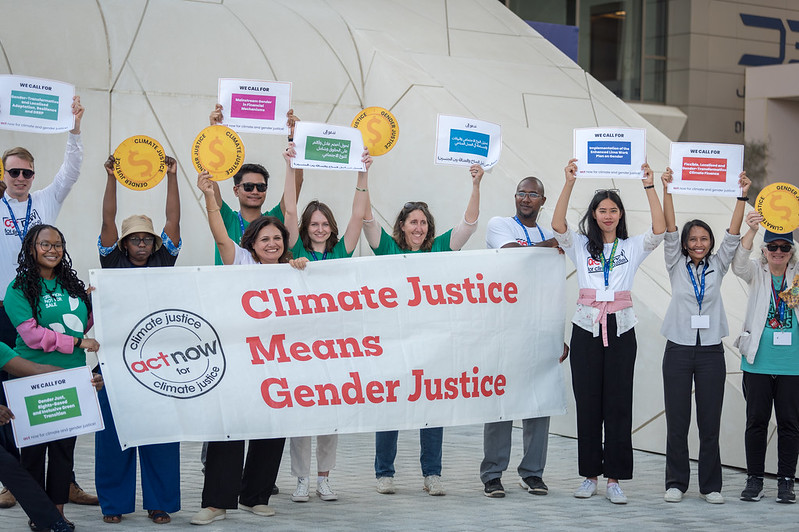The ACT Alliance expresses profound concern over the ongoing atrocities in Palestine and Israel, which have far-reaching consequences for the entire region and, indeed, the world. On October 7, 2023, Hamas killed 1200 and kidnapped hundreds of Israelis in a violent organized operation. As a reaction, the government of Israel has launched one of the most atrocious military attacks on Gaza, affecting its more than 2.2 million inhabitants.
According to UNHCR to date there are 1.7 million displaced men and women, boys and girls in Gaza. More than 14,800 men and women, boys and girls, journalists, doctors, humanitarians, and religious leaders, have been reported killed. Thousands of people are still missing, and more than 2000 are believed dead under the rubble.
The Israeli airstrikes severely damaged civilian infrastructures. This includes hospitals, places of worship, UN-led facilities, schools, and private residences. According to the World Health Organization (WHO), the Gaza Strip is wrestling with an intolerable situation exacerbated by airstrikes and a severe shortage of fuel, water, and food, alongside restricted access to medical facilities and supplies.
Violence has also erupted in the West Bank and southern Lebanon. Hundreds of Palestinians have been killed and more than 2500 have been arrested. Our members and UN- OCHA report that episodes of violence by settlers against Palestinians are on the rise and their human rights are being violated.
ACT Alliance, a global network of more than 150 faith-based organisations operating in more than 120 countries, call for an immediate ceasefire. We call on governments believing in humanitarian law and human rights, to uphold the rights of civilians enshrined In the Geneva Conventions.
We welcome the release of women, girls, men, and boys who were captured by Hamas, as well as the Palestinian children and women prisoners held by Israel. However, we stress the urgency of stopping all arbitrary and unlawful detentions. We call for the immediate release of all unlawfully detained individuals and urge the liberation of all remaining hostages held by Hamas.
No “humanitarian pause”, unilateral “Safe zone” or partial truce are acceptable sustainable solutions. The only solution to this tragic war is a long-lasting ceasefire. Given the outrageous humanitarian situation in the Gaza Strip, more support to the civilian population needs to reach those in need. For this reason, we call on all governments to advocate for all borders to be open to humanitarian assistance operations. We stress that this is key for those requiring urgent medical assistance to be allowed to reach East Jerusalem’s medical facilities. Currently, more than 600 cancer patients cannot receive treatment, this includes paediatric patients.
We find solace in the solidarity shown by millions across the world to those affected by this war and we join those calls for justice.
We express our support and solidarity to our colleagues, our members and the ACT Palestine Forum who are on the frontlines of humanitarian relief operations and have lost family members, colleagues, homes, places of work and worship. We join our voices to the millions worldwide fervently calling for an immediate ceasefire and an end to the unlawful occupation of Palestine by Israel.
We call on the international community and all international relevant bodies to intervene immediately and to begin the necessary investigations to ensure that those responsible for any violation of international humanitarian law are held accountable. We also call on the international community and bodies to address the root causes of the Israeli and Palestinian conflict and we urge all stakeholders to engage in a constructive and open dialogue to ensure that long-lasting seeds of peace are sown, based on international law and relevant UN resolutions.
Declaración de ACT Alliance sobre la guerra en Gaza y las violaciones del principio humanitario de protección de civiles durante conflictos armados
La Alianza ACT expresa profunda preocupación por las atrocidades en curso en Palestina e Israel, que tienen consecuencias de gran alcance para toda la región y, de hecho, para el mundo entero. El 7 de octubre de 2023, Hamas mató a 1200 personas y secuestró a cientos de israelíes en una violenta operación organizada. Como reacción, el gobierno de Israel lanzó uno de los ataques militares más atroces en Gaza, afectando a sus más de 2.2 millones de habitantes.
Según ACNUR, hasta la fecha hay 1.7 millones de hombres y mujeres, niños y niñas desplazados en Gaza. Más de 14,800 personas, incluyendo periodistas, médicos, humanitarios y líderes religiosos, han sido reportadas como fallecidas. Miles de personas aún están desaparecidas, y se cree que más de 2000 han muerto bajo los escombros.
Los ataques aéreos israelíes dañaron gravemente infraestructuras civiles, incluyendo hospitales, lugares de culto, instalaciones dirigidas por la ONU, escuelas y residencias privadas. Según la Organización Mundial de la Salud (OMS), la Franja de Gaza enfrenta una situación intolerable exacerbada por los ataques aéreos y una grave escasez de combustible, agua y alimentos, junto con un acceso restringido a instalaciones y suministros médicos.
La violencia también ha estallado en Cisjordania y el sur del Líbano. Cientos de palestinos han sido asesinados y más de 2500 han sido arrestados. Nuestros miembros y la ONU-OCHA informan que los episodios de violencia de colonos contra palestinos están en aumento y se están violando sus derechos humanos.
ACT Alliance, una red global de más de 150 organizaciones basadas en la fe que operan en más de 120 países, solicitan un alto el fuego inmediato. Instamos a los gobiernos que creen en el derecho humanitario y los derechos humanos a defender los derechos de los civiles consagrados en los Convenios de Ginebra.
Aplaudimos la liberación de mujeres, niñas, hombres y niños capturados por Hamas, así como de los niños y mujeres palestinos prisioneros de Israel. Sin embargo, enfatizamos la urgencia de detener todas las detenciones arbitrarias e ilegales. Pedimos la liberación inmediata de todas las personas detenidas ilegalmente y instamos a la liberación de todos los rehenes restantes en manos de Hamas.
Ninguna “pausa humanitaria”, “zona segura” unilateral o tregua parcial son soluciones sostenibles aceptables. La única solución para esta guerra trágica es un alto el fuego duradero. Dada la impactante situación humanitaria en la Franja de Gaza, es necesario que más apoyo llegue a la población civil que lo necesita. Por esta razón, instamos a todos los gobiernos a abogar por que todas las fronteras estén abiertas a las operaciones de asistencia humanitaria. Subrayamos que esto es crucial para que aquellos que necesitan asistencia médica urgente puedan llegar a las instalaciones médicas de Jerusalén Este. Actualmente, más de 600 pacientes de cáncer no pueden recibir tratamiento, incluidos los pacientes pediátricos.
Encontramos consuelo en la solidaridad mostrada por millones en todo el mundo hacia los afectados por esta guerra y nos unimos a esos llamados a la justicia.
Expresamos nuestro apoyo y solidaridad a nuestros colegas, miembros y al Foro de Palestina de ACT que están en la primera línea de las operaciones de ayuda humanitaria y han perdido familiares, colegas, hogares, lugares de trabajo y culto. Unimos nuestras voces a las de millones en todo el mundo que claman fervientemente por un alto el fuego inmediato y el fin de la ocupación ilegal de Palestina por parte de Israel.
Instamos a la comunidad internacional y a todos los organismos internacionales pertinentes a intervenir de inmediato y comenzar las investigaciones necesarias para asegurar que quienes sean responsables de cualquier violación del derecho internacional humanitario rindan cuentas. También instamos a la comunidad internacional y a los organismos a abordar las causas fundamentales del conflicto israelí-palestino y urgimos a todas las partes interesadas a participar en un diálogo constructivo y abierto para garantizar que se siembren semillas de paz duraderas, basadas en el derecho internacional y las resoluciones pertinentes de la ONU.
Déclaration de l’ACT Alliance sur la guerre à Gaza et les violations du principe humanitaire de protection des civils pendant les conflits armés
L’ACT Alliance exprime une profonde préoccupation face aux atrocités en cours en Palestine et en Israël, qui ont des conséquences considérables pour toute la région et, en effet, pour le monde entier. Le 7 octobre 2023, le Hamas a tué 1200 personnes et kidnappé des centaines d’Israéliens lors d’une opération violente et organisée. En réaction, le gouvernement d’Israël a lancé l’une des attaques militaires les plus atroces contre Gaza, affectant ses plus de 2,2 millions d’habitants.
Selon le HCR, à ce jour, 1,7 million d’hommes et de femmes, de garçons et de filles sont déplacés à Gaza. Plus de 14 800 hommes et femmes, garçons et filles, journalistes, médecins, humanitaires et leaders religieux ont été signalés comme tués. Des milliers de personnes sont toujours portées disparues, et plus de 2000 sont présumées mortes sous les décombres.
Les frappes aériennes israéliennes ont gravement endommagé les infrastructures civiles, y compris les hôpitaux, les lieux de culte, les installations dirigées par l’ONU, les écoles et les résidences privées. Selon l’Organisation mondiale de la santé (OMS), la bande de Gaza est confrontée à une situation intolérable exacerbée par les frappes aériennes et une pénurie grave de carburant, d’eau et de nourriture, ainsi qu’un accès restreint aux installations médicales et aux fournitures.
La violence a également éclaté en Cisjordanie et dans le sud du Liban. Des centaines de Palestiniens ont été tués et plus de 2500 ont été arrêtés. Nos membres et l’ONU-OCHA rapportent que les épisodes de violence des colons contre les Palestiniens sont en augmentation et que leurs droits humains sont violés.
L’ACT Alliance, un réseau mondial de plus de 145 organisations confessionnelles opérant dans plus de 120 pays, appellent à un cessez-le-feu immédiat. Nous demandons aux gouvernements qui croient en le droit humanitaire et les droits de l’homme de défendre les droits des civils consacrés dans les Conventions de Genève.
Nous saluons la libération des femmes, des filles, des hommes et des garçons capturés par le Hamas, ainsi que des enfants palestiniens et des femmes détenus par Israël. Cependant, nous soulignons l’urgence d’arrêter toutes les détentions arbitraires et illégales. Nous appelons à la libération immédiate de toutes les personnes détenues illégalement et exhortons à la libération de tous les otages restants détenus par le Hamas.
Aucune “pause humanitaire”, “zone sûre” unilatérale ou trêve partielle n’est une solution durable acceptable. La seule solution à cette guerre tragique est un cessez-le-feu durable. Étant donné la situation humanitaire scandaleuse dans la bande de Gaza, un soutien accru à la population civile doit atteindre ceux qui en ont besoin. Pour cette raison, nous appelons tous les gouvernements à plaider pour que toutes les frontières soient ouvertes aux opérations d’aide humanitaire. Nous soulignons que cela est essentiel pour permettre aux personnes ayant besoin d’une assistance médicale urgente d’atteindre les installations médicales de Jérusalem-Est. Actuellement, plus de 600 patients atteints de cancer ne peuvent pas recevoir de traitement, y compris les patients pédiatriques.
Nous trouvons du réconfort dans la solidarité manifestée par des millions de personnes dans le monde envers ceux touchés par cette guerre, et nous nous joignons à ces appels à la justice.
Nous exprimons notre soutien et notre solidarité à nos collègues, membres et au Forum de Palestine de l’ACT qui sont en première ligne des opérations de secours humanitaires et ont perdu des membres de leur famille, des collègues, des foyers, des lieux de travail et de culte. Nous unissons nos voix à celles de millions de personnes dans le monde entier appelant avec ferveur à un cessez-le-feu immédiat et à la fin de l’occupation illégale de la Palestine par Israël.
Nous exhortons la communauté internationale et tous les organismes internationaux pertinents à intervenir immédiatement et à entreprendre les enquêtes nécessaires pour s’assurer que les responsables de toute violation du droit international humanitaire soient tenus pour responsables. Nous appelons également la communauté internationale et les organismes à aborder les causes profondes du conflit israélo-palestinien et nous exhortons toutes les parties prenantes à s’engager dans un dialogue constructif et ouvert pour garantir que des graines de paix durables soient semées, basées sur le droit international et les résolutions pertinentes de l’ONU.




